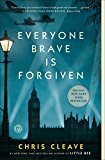Summary | Excerpt | Reading Guide | Reviews | Beyond the Book | Readalikes | Genres & Themes | Author Bio

Everyone Brave is Forgiven
September, 1939
MARY ALMOST WEPT WHEN she learned that her first duty as a schoolmistress would be to evacuate her class to the countryside. And when she discovered that London had evacuated its zoo animals days before its children, she was furious. If one must be exiled, then at least the capital ought to value its children more highly than macaws and musk oxen.
She checked her lipstick in a pocket mirror, then raised her hand.
"Yes, Miss North?"
"Isn't it a shame to evacuate the animals first?"
She said it in full hearing of all the children, who were lined up at their muster point outside the empty London Zoo, waiting to be evacuated. They gave a timid cheer. The headmistress eyed Mary coolly, which made her doubt herself. But surely it was wrong to throw the beasts the first lifeline? Wasn't that the weary old man's choice Noah had made: filling the ark with dumb livestock instead of lively children who might answer back? This was how the best roots of humanity had drowned. This was why men were the violent inbreds of Ham and Shem and Japheth, capable of declaring for war a season that Mary had earmarked for worsted.
The headmistress only sighed. So: the delay was simply because one did not need to write a marmoset's name on a luggage tag, accompany it in a second-class train compartment and billet it with a suitable host family in the Cotswolds. The lower primates only wanted a truck for the trip and a good feed at the other end, while the higher Hominidae, with names like Henry and Sarah, had a multiplicity of needs that a diligent bureaucracy had not only to anticipate but also to meet, and furthermore to document, on forms that must first come back from the printer.
"I see," said Mary. "Thank you."
Of course it was that. She hated being eighteen. The insights and indignations burned through one's good sense like hot coals through oven gloves. So, this was why London still teemed with children while London Zoo stood vacant, with three hundred halfpenny portions of monkey nuts in their little twists of newspaper waiting unsold and forlorn in the kiosk.
She raised her hand again, then let it drop.
"Yes?" said Miss Vine. "Was there something else?"
"Sorry," said Mary. "It was nothing."
"Oh good."
The headmistress took her eye off the ranks of the children for a moment. She fixed Mary with a look rich in charity. "Remember you're on our side now. You know: the grown-ups."
Mary could almost feel her bones cracking with resentment. "Thank you, Miss Vine."
This was when the school's only colored child, sensing an opening, slipped away from the muster and scaled the padlocked main gate of the zoo. The headmistress spun around. "Zachary Lee! Come back here immediately!"
"Or what? You'll send me to the countryside?"
The whole school gasped. Ten years old, invincible, the Negro boy saluted. He scissored his skinny brown legs over the top of the gate, using the penultimate and the ultimate wrought-iron O's of LONDON ZOO as the hoops of a pommel horse, and was immediately lost to sight.
Miss Vine turned to Mary. "You had better bring the nigger back, don't you think?"
It was her first rescue work of the war. Coppery, coltish Mary North searched the abandoned zoo using paths that were still well tended. On her own, she felt better. She sneaked a cigarette. With the other hand she massaged her brow, confident that frustration could be persuaded not to settle there. All downers could be dispatched, as one might flick ash off one's sleeve, or pilot a wayward bee back out through an open window.
She had already checked the giraffes' paddock and the big cats' dens. Now, hearing a cough, she tiptoed into the great apes' enclosure through a gate that swung unlatched. She kicked through the straw, raising a scent of urine and musk that made her heart rattle with fright. But she hoped it was not easily done, for a zookeeper to miss a whole gorilla when he was counting them into the evacuation truck.
Excerpted from Everyone Brave is Forgiven by Chris Cleave. Copyright © 2016 by Chris Cleave. Excerpted by permission of Simon & Schuster. All rights reserved. No part of this excerpt may be reproduced or reprinted without permission in writing from the publisher.
Analyzing humor is like dissecting a frog. Few people are interested and the frog dies of it.
Click Here to find out who said this, as well as discovering other famous literary quotes!
Your guide toexceptional books
BookBrowse seeks out and recommends the best in contemporary fiction and nonfiction—books that not only engage and entertain but also deepen our understanding of ourselves and the world around us.